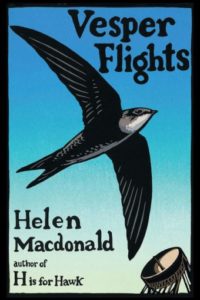A not-too-serious and also quite serious list that is entirely non-prescriptive, and is absolutely not a set of instructions. Your mileage will vary wildly. There are as many ways to write about the natural world as there are kinds of beetles. But these are the things I really do tell myself when I write about nature, and today I decided I’d confess them all.
1.
Avoid the Frederick Forsyth explanatory mode.
I adore the way Forsyth breaks the narratives of his thrillers in order to dump data on the reader. Here’s an example: after a character in The Dogs of War discovers platinum deposits there follows a lengthy disquisition on the international platinum market, and shortly after this, a history of catalytic converters. I’m not complaining about this mode, but in writing about nature, I try to be more like John Le Carré. You don’t catch him explaining the history and workings of the British security services. He just puts two men in a club in Whitehall and you learn what you need from what they say. And what they don’t say.
2.
Don’t talk down to readers.
They may know as much as you do about your subject, or more. If they don’t, they don’t want to be told how lucky they are to have you tell them all about it. Military techno-thrillers are often packed with acronyms like SOSUS and AIM-9s and Pratt & Whitney J-57s, and even if you don’t know what the hell those things are, you feel you’re being talked to as an equal when you encounter them on the page (and these days, it’s not difficult to look them up). Same goes for nature. And as for technology. . .
3.
Don’t make the space pre-industrial.
This is such a classic genre move it’s almost automatic, and it works in the same way wildlife art hardly ever shows evidence that humans have ever existed. If there are burned-out cars and shotgun-addled road signs, or a creek full of trash and a high-security perimeter fence alongside the singing nightingale, don’t leave them out. That’s how this world is. Honor it.
4.
Things allowed in nature writing include. . .
Jokes, sex, brand names, illness, food, insomnia, laziness, movie references, lovesickness, yeast cookery, even the history of armored vehicles, if that seems relevant—the list is pretty much endless (David Gessner’s wonderful essay collection Sick of Nature is glorious on this—he complains productively of how tired and sick he is, not of nature, but the “hushed voice” and “saintliness” of a certain kind of writing about it.)
Also, the voices of other people. One of the joys of Tim Dee’s recent book on gulls, Landfill, is how, between his fiercely lyrical and thoughtful observations, he lets the people he meets talk at length over the book’s pages. He amplifies their voices; he lets them breathe; he never speaks for them.
5.
Be honest when you don’t feel it.
Ambivalence is interesting and sometimes the natural world is boring. Sometimes you can be striding up a mountain trail, surrounded by clouds, and be thinking only of your malfunctioning washing machine. When the natural world offers only blankness, and doesn’t feel writable-about, it’s useful to start wondering why. Tugging on that thread can unpick a whole load of hidden assumptions about our relationship to natural environments; what we ask of them, what we want from them, and why.
6.
The Great Nature Writing Debate
I’m a contrary person, and generally respond badly to being told what I should think, or how I should feel. Some writers are magnificently polemical. I am not good at being so, although the nightmarishness of our current political and environmental situation is spurring me to try harder to do so. What I have sought to do instead is offer readers complication and wonderment, as well as vantage on the issues that burn around us.
It’s important to consider how and why we value particular landscapes and creatures, and why we value some less than others. If you can instill wonderment and complication, you can forge in others attachments to the world. No one fights to save what they don’t love; no one can love what they don’t know. (NB: outside the remit of writing about nature: organize and make good trouble.)
7.
It’s usually about you.
It’s not possible to write about nature without including a lot of information about yourself. Race, gender, class, and personal history will inform what you say, even if nature is supposed to be free of such concerns—in fact, particularly because it is supposed to be free of them.
If you’re sad about the disappearance of a landscape or the local extinction of a creature, think about why exactly you are mourning them. It’s not going to be entirely conservation-led, nor simply a fascinating instantiation of an aspect of environmental philosophy. Do not shy away from the specificity of how you, as an individual, feel. If you mourn something, if you can communicate that loss, the reader can mourn with you.
8.
But sometimes it’s not.
Sometimes it’s not about you. Encountering an animal is always a strange experience; they’re built of all the things you have learned about them, from books, television, magazines, conversations, images. But behind all those is a self-willed, non-human entity that exists in its own umwelten, its own life-world. Animals aren’t just repositories for human meanings, even if we unthinkingly use them to reflect our own selves and concerns. They are always more, always reminders that the world does not exist for us alone. They resist us. Behind all our human clutter, they are entirely, and perfectly, themselves.
9.
Be specific.
The great English nature writer Richard Mabey has written beautifully on this. He quoted John Fowles’s suggestion that the name of a creature is a “pane of dirty glass between you and it” and then took righteous and blistering exception to it. “It seems to me,” he explained, “that naming a plant … is a gesture of respect towards its individuality, its distinction from the generalized green blur.”
His observation has extreme salience in terms of our understanding of biodiversity loss. As Barry Lopez wrote in his essay “The Stone Horse,” you have to be able to make such distinctions “to be able to talk clearly about the world.” Ryegrass monoculture and a verdant meadow are both green blurs, but one supports a complex wealth of lives and one does not. You can’t comprehend what is under threat, what has already gone missing, what we should fight to restore, unless you can see those differences.
10.
But not too specific.
There’s joy in knowing things, and a delight in fine taxonomic distinctions. But one can go too far along the road of specificity. I’ve been known to fall into the nature-writers’ trap of wanting to demonstrate my expertise. I have fallen prey to the need to carefully look up the identities of various plants and insects and fungi I have seen so that I can state their names in a piece I’m writing. Then, one day, I realized that this is not honest, and neither is it generous. Say when you see something and you don’t know what it is. You can find out later, and you can write about that process too.
11.
Sometimes what you think you are writing about is not what you are writing about.
I am sure this happens to everyone who’s tried to write anything, and particularly writers like me, who tend not to plan pieces but work on them organically (it’s inefficient, but I don’t seem to be able to do it any other way). It took me a long time to understand that sometimes, when I thought I was writing about ibises, I was really writing about homesickness, or when I thought I was writing about homesickness, what I was really writing about was ibises.
Homes, not spiders; loneliness, not riparian forest. I learned to listen very carefully to what was going on between the lines, to always pay attention to what the words in front of you are really saying. It’s never too late to stop and start again (unless you’re on deadline).
__________________________________

Helen Macdonald’s essay collection, Vesper Flights, is available now.



